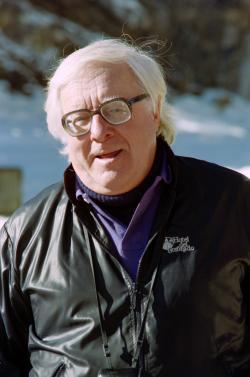A dyed-in-the-wool sci-fi nerd, I came to Ray Bradbury in my early teens because of where he was shelved with the Big Three in our local library (after Isaac Asimov, before Arthur C. Clarke and Robert Heinlein). He never fit the company, however and that’s probably what explains his staying power.
Bradbury’s rocket ships were not souped-up fighter jets. Instead, they were the latter-day descendents of Joseph Conrad’s sailing ships: You traveled on them not so much to encounter adventures (“Look, Buck, another Alien!” “Shoot him!”) as to think about what the encounter might mean (Wait, who’s really the alien here?). His Mars was not an arid red desert, it was—God, how vividly I recall this across three decades—filled with towns where enigmatic old ladies puttered around on the same kinds of charming but pointless errands little old ladies do in Marcel Proust’s Combray.
Clarke, Asimov, and Heinlein imbibed (or invented) the ethos of John Campbell’s Astounding Science Fiction, and in readers’ minds they remain unalterably connected to real or imagined technological innovations, committed to scientifically plausible narratives. Clarke is remembered for the communications satellite, Asimov for the Three Laws of Robotics, Heinlein for the teen testosterone of Glory Road and Starship Troopers (and for his baroque “grok” fantasies of Stranger in a Strange Land: Late in life, Heinlein is a John Bircher mugged by the ‘60s). Bradbury’s place in the club, though, was always tenuous, and that’s perhaps what makes him such a great writer, what ensures his pesky little vignettes (often barely even stories) will stay lodged deep in readers’ brain long after Firefly and Star Trek have finished their runs.
He always found a way to puzzle, and even to mess with, his readers. The stories in The Martian Chronicles took place on Mars, in a future that apparently followed on from our own day, technologically speaking. So by rights (and despite their early rave endorsement from the oddball English writer Christopher Isherwood) they should have been mainline science fiction—and in fact a generation later Kim Stanley Robinson did more or less redo the Mars colonization story as straight SF.
But no. I remember reading “Mars is Heaven” at about age 12 with all the shock and disbelief that probably would have hit me if I’d tried to read Proust—or rather, with all the shock that would not have hit me, but would have gone far over my head had it actually been Proust. A spaceship lands on Mars, and the astronauts disembark to find an idyllic small town in which all their childhood fantasies are fulfilled (Bradbury was born in 1920 and raised in Waukegan, Ill.). That night, though, the crewmembers who have thrown themselves into their idyllic Waukegan past die: Only the doubters survive. Somehow, it’s the moment in which the happy nostalgics drift away into their respective houses for the evening that stays with me, not the aftermath.
Coming off a straight diet of shoot-‘em-up-and-blast-off Tom Swifts, I vividly recall reading Bradbury the same way I read Cordwainer Smith, Norman Spinrad, and especially Philip K. Dick—with the uneasy sense that something’s happening here, what it is ain’t exactly clear. In a weird way, Bradbury is (like T.S. Eliot or Willa Cather) an Imagist: He succeeds not by telling a complete story, but by lodging some enigmatic unforgettable image deep in a reader’s brain—like those men moving in the twilight into houses that both are and are not their childhood homes.
Bradbury’s disguise as a straight science-fiction writer is almost perfect. When he describes a spaceship diving toward the sun (in “The Golden Apples of the Sun”; perhaps the only sci-fi story with a Yeats line for a title), he puts in all the requisite details about frozen ice shields and malfunctioning auxiliary pumps: The hero even saves the ship with a Walter Mitty-esque stab of a screwdriver. But Bradbury really wrote the story so he can describe the moment when the captain pulls out of the sunward dive. “North” he says—north because when leaving the sun every direction is north.
One way to sum Bradbury up is to notice that he is just about the only American science fiction writer to claim, proudly, the label “fantasy” for his books. Fahrenheit 451 (which led to a Truffaut movie starring Julie Christie) was his only “real” SF book, he said. You might even locate him in a middle ground between the best American fantasy (Ursula Le Guin’s Earthsea books, Marion Zimmer Bradley) and the hypermasculine world of Astounding Science Fiction. And if dropping Bradbury between Le Guin and Heinlein makes him seem suggestively androgynous, well that’s probably right too.
I hate the idea that Bradbury exists now only as the sum total of his words. As if, once you’ve re-read Something Wicked This Way Comes, Dandelion Wine, The Illustrated Man, I Sing the Body Electric (the cheesy covers are taxi-ing back to me as I type this) and a couple dozen more books, you’ve got Bradbury in toto.
I reject the idea. Like his quirky, unclassifiable Mars, there’s always just slightly more to Bradbury than what you can see with the naked eye. He’s always up ahead a ways, smiling enigmatically over his shoulder. Then pulling slowly away from you. North.
